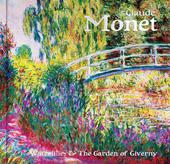
|
Claude Monet: Waterlilies and the Garden of Giverny
Hardback
Main Details
Description
A gorgeous new edition with the cover printed on silver. Towards the end of his life and much inspired by Japanese water gardens, Monet spent a great deal of time in his beloved Giverny. Adorned with poppies, blue sage, dahlias and irises, the waters were disturbed only by bamboos and water lilies. His water garden was originally created to satisfy a need to be near water, and to provide a visual feast that could be enjoyed from his house. The pond was fed by the river Ru, and weeping willow and silver birch hung over its edges, caressing the fronds of the greenery and blossoms below. Its famous green wooden footbridge was built across the water and it became the central focus of many of his works. He said, 'It took me some time to understand my water lilies. I planted them for pleasure.' and so he began to work on what is probably the most famous series of paintings the world has ever seen. AUTHOR: Julian Beecroft is a freelance writer and editor specialising in the arts. He has written extensively on the Canadian artists Tom Thomson, Emily Carr and the Group of Seven for Dulwich Picture Gallery in London and the Groninger Museum in Groningen, The Netherlands, as well as for The Guardian, The London Magazine and other publications. Previously, he has written on classical music for Flame Tree Publishing. He is currently writing a book on the art, culture and history of Canada. SELLING POINTS: . Authoritative art book as well as coffee-table gem. . Ideal for fans of beautiful, serene art. . A thoughtful text focusing on Monet's later life . Gorgeous full-page reproductions of famous works. . New title in our bestselling Masterworks series. 150 illustrations
Author Biography
Dr Julian Beecroft is a writer specializing in art and cultural history. He has written books on Monet, Renoir, Dali, Kahlo and Art Nouveau. He is also the author of Lost Cities and Secret Cities, as well as a guide to the culture and history of London. He has contributed to the Guardian, the Telegraph, 1843 and The London Magazine.
|